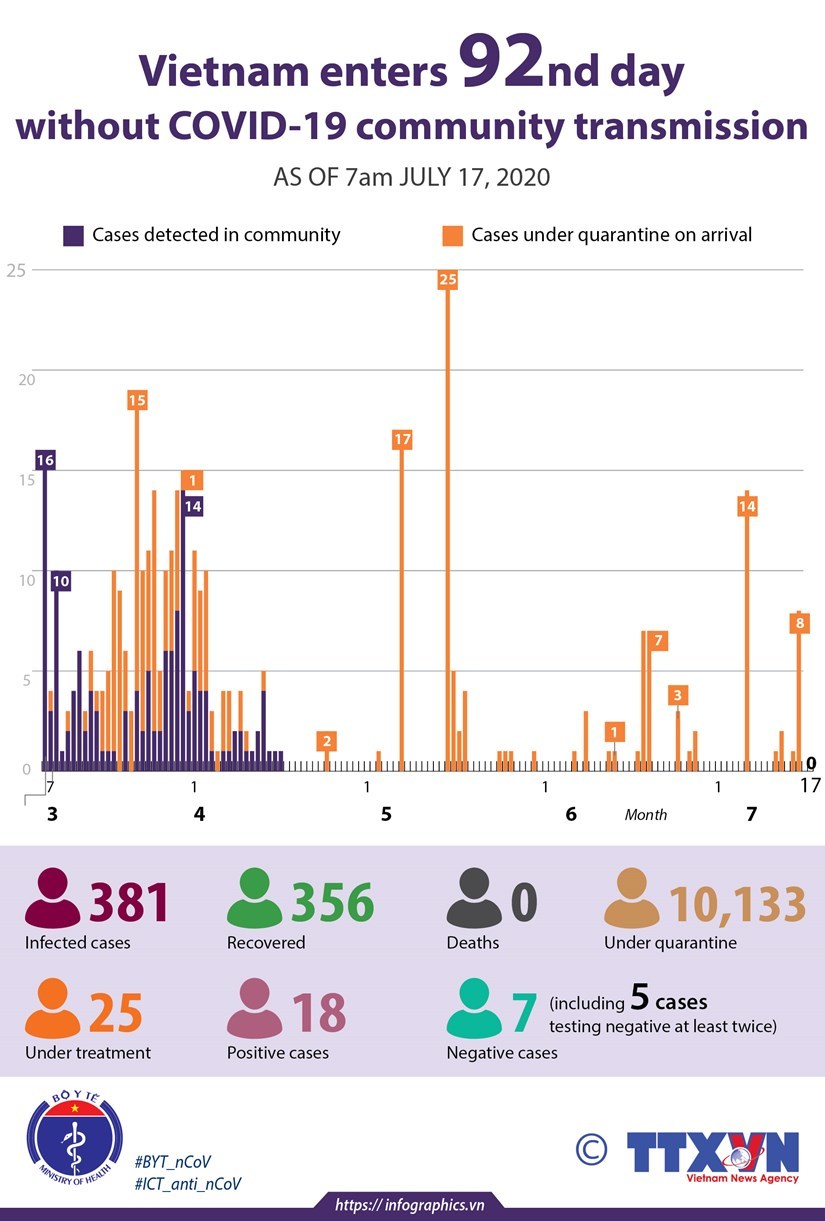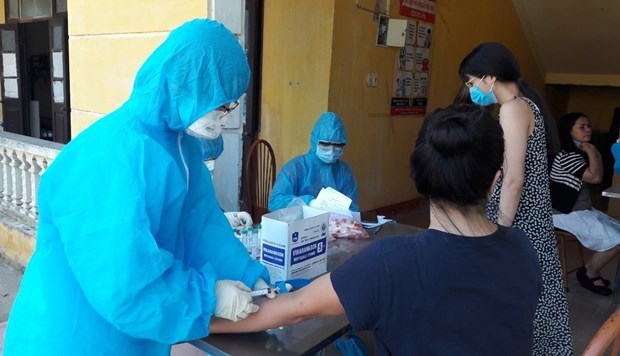 |
| Vietnamese citizens in Australia wait to handle boarding procedures at Sydney Airport on July 13 |
Vietnam has organised 55 flights bringing 13,323 citizens home from overseas since April 10 in the face of the COVID-19 pandemic, spokeswoman for the Ministry of Foreign Affairs Le Thi Thu Hang said on July 16.
She said at the ministry’s regular press conference that under the direction of the country’s leaders, in particular the Prime Minister, relevant agencies and Vietnam’s overseas representative bodies have worked closely with authorities in host countries to bring Vietnamese citizens home.
Agencies, ministries, and sectors in Vietnam, including the Ministry of Foreign Affairs, the Ministry of Transport, the Ministry of National Defence, the Ministry of Health, and the Ministry of Public Security, will continue working with the country’s overseas representative bodies to bring more citizens home on the basis of their aspirations, repatriation priorities, and domestic quarantine capacity, according to the spokeswoman.
Replying to a question about online ticket scams targeting citizens who wish to return to home, she cited national flag carrier Vietnam Airlines as saying that it has warned passengers, especially overseas citizens, about such online ticket scams.
Since the pandemic broke out and the Vietnamese Government began conducting repatriation flights for its citizens in disadvantaged circumstances, the country’s overseas representative bodies and the Foreign Ministry’s Consular Department have publicised information about related procedures on their websites and on the media.
Citizens who wish to return to home need to register with Vietnam’s representative bodies in the host country, and agencies will then work with domestic authorities and contact each person by email to inform them on ticket booking procedures, Hang noted.
She recommended that to protect their interests, overseas Vietnamese citizens need to follow the instructions issued by Vietnamese representative bodies and only buy tickets after receiving official emails from these agencies.
Vietnam clear of community coronavirus infections for 92 days
There were no new cases of coronavirus infection to report in Vietnam on July 17 morning, and the country has stayed free of community transmission of the virus for 92 consecutive days.
|
|
|
A medical worker takes a blood sample from a recently repatriated overseas Vietnamese for COVID-19 testing at a quarantine site in Ha Nam province
|
According to the National Steering Committee for COVD-19 Prevention and Control, as many 241 of the 381 confirmed patients are imported cases who were quarantined upon their arrival in the country.
Up to 356 patients or 93.4 percent of the total have recovered from the disease.
Meanwhile, most of those still under treatment are in stable condition, including two negative for SARS-CoV-2, the virus that causes COVID-19, once and five others at least twice.
There are 10,133 people having close contact with confirmed cases or coming from pandemic-hit areas in quarantine at present, including 78 in hospitals, 9,613 in other quarantine sites, and 442 at home or accommodation facilities.
Defence Ministry donates medical supplies to help Cuba fight COVID-19
The Ministry of National Defence handed over medical supplies to Cuba at a ceremony in Hanoi on July 16 to aid its fight against the coronavirus.
The aid included quick COVID-19 test kits, medical masks, and personal protective equipment (PPE).
In remarks at the ceremony, Deputy Defence Minister Nguyen Chi Vinh said success in containing the COVID-19 pandemic not only requires the efforts of each country but also international cooperation. “International cooperation in COVID-19 response is crucial,” he said.
Vietnam has been moved by the efforts of the Politburo of the Cuban Communist Party to quickly respond to all of its requests for cooperation in defence and COVID-19 relief since the disease broke out, he noted.
The deputy minister said Vietnam greatly appreciates Cuba sending hundreds of health care workers and medicine to many countries around the world to help fight the pandemic, despite facing numerous difficulties itself.
In the current circumstance, Vietnam and Cuba providing each other with medical supplies is vivid evidence of the brotherhood and solidarity between the two countries, which is significant and meaningful to bilateral relations, Vinh went on to say.
It will help both sides together be victorious over COVID-19 and at the same time lay a foundation for long-term cooperation in health care, he added.
Cuban Ambassador to Vietnam Lianys Torres Rivera thanked Vietnam for its medical support, saying she is very happy that both countries have controlled the disease better than many developed nations.
The aid clearly demonstrates the special friendship between the two countries’ people, she said. “We have never abandoned each other, even in the most difficult situation.”
Vietnam and Cuba celebrate 60 years of bilateral diplomatic this year (December 2, 1960 - 2020).
Nearly 280 Vietnamese flown home from Russia, Belarus
Nearly 280 Vietnamese citizens in Russia and Belarus were repatriated on a flight that landed at Van Don International Airport, the northern province of Quang Ninh, on July 17.
They include children under 18, pregnant women, people with illnesses, workers with expired visas or labour contracts, and students without accommodation due to COVID-19-induced school and dormitory closures.
The flight was arranged by the Ministry of Foreign Affairs, authorised agencies of Vietnam, the Vietnamese embassies in Russia and Belarus, the national flag carrier Vietnam Airlines, and relevant agencies of the host countries.
As many countries have imposed travel restrictions for fear of the pandemic, the embassies had actively worked with the host countries’ authorities to prepare necessary procedures and instruct the citizens to move to airports in Moscow and Minsk. They had also sent staff to the airports to coordinate with the airlines and local authorities to assist the citizens in handling relevant procedures.
Disease prevention measures had been carried out during the flight. Upon landing at Van Don airport, the passengers received health check-ups and were sent to quarantine centres in line with regulations.
In the time ahead, authorised agencies of Vietnam, the country’s overseas representative bodies and domestic airlines will conduct more repatriation flights on the basis of pandemic developments, overseas citizens’ aspirations, and local quarantine capacity.
From April 10 to July 16, Vietnam organised 55 flights bringing 13,323 citizens home from overseas in the face of the COVID-19 pandemic, according to spokeswoman for the Ministry of Foreign Affairs Le Thi Thu Hang.
Kazakhstan receives medical supplies from Vietnam
Kazakhstan lower house on July 16 announced that the Vietnamese National Assembly had sent humanitarian aid in the form of personal protective equipment (PPE) to help Kazakhstan people curb the spread of COVID-19.
The PPE from Vietnam has been sent to medical facilities in Atyrau province in western Kazakhstan, it said in a press release.
The Kazakhstan lower house appreciated the gift from the Vietnamese NA, adding that the distribution of the humanitarian aid was made under the supervision of members of the Kazakhstan lower and upper houses.
Indonesia reports highest daily COVID-19 death toll, Philippines deploys police to quarantine patients
The Indonesian Ministry of Health reported 87 new coronavirus deaths on July 15, its biggest daily jump, taking the total number of fatalities to 3,797.
Indonesia also reported 1,522 COVID-19 infections, putting the overall tally at 80,094 cases.
In the Philippines, police are being deployed to ensure people who test positive for the coronavirus and cannot self-isolate at home are taken to state-run quarantine centres.
The move comes as authorities step up efforts to slow the rapid spread of the disease by increasing testing, re-imposing lockdowns, and building dozens of quarantine centres for patients with mild symptoms.
To clamp down on local transmission, police are accompanying health workers to the homes of people who have tested positive and taking them to government facilities if their homes are considered inadequate for self-isolation or if they live with "vulnerable" people. All expenses are covered by the Philippine government.
The Philippines already has more than 8,300 quarantine centres with over 73,000 beds. To handle the growing number of cases, the government plans to build 50 more facilities.
After imposing one of the world's longest lockdowns, the country has been easing restrictions in recent weeks, fuelling a surge in new infections.
It had 58,850 confirmed cases on July 15, with 1,614 deaths.
 |
|
|
VNA/VNN/VOV/VNS
